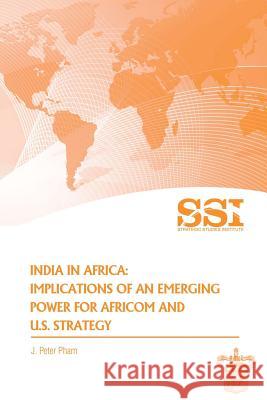India in Africa: Impllications of an Emerging Power for Africom and U.S. Strategy » książka
India in Africa: Impllications of an Emerging Power for Africom and U.S. Strategy
ISBN-13: 9781477627563 / Angielski / Miękka / 2012 / 62 str.
India in Africa: Impllications of an Emerging Power for Africom and U.S. Strategy
ISBN-13: 9781477627563 / Angielski / Miękka / 2012 / 62 str.
(netto: 57,61 VAT: 5%)
Najniższa cena z 30 dni: 60,15 zł
ok. 16-18 dni roboczych
Bez gwarancji dostawy przed świętami
Darmowa dostawa!
Several trends make this monograph topic important. First, Africa, long marginalized in international relations, has emerged today as a strategically, diplomatically, and economically vital component in the global balance of the 21st century, with the major powers seeking access to the continent's resources and forging ties with African governments and peoples. The establishment of the United States Africa Command (AFRICOM) is but one indication of America's growing network of political, economic, and security commitments in Africa. Second, the United States is also actively seeking to build a strong strategic partnership with India, a country whose rapid economic growth, geopolitical position, and proven commitment to democracy make it an especially attractive ally not just in South Asia, but more broadly. Third, as it continues its rise to global power status, India is cultivating its own expanding set of relations across the African continent-a phenomenon that is nowhere as well known as the increasing penetration there of the People's Republic of China. In this monograph, Dr. J. Peter Pham provides a framework for understanding both India's approach to Africa, especially in the military and security sector, and the responses of Africans to it. He also argues that the United States should engage India in Africa, both as an end in itself and within the context of broader U.S.-India ties. What emerges from this analysis is a call to both greater mutual awareness and concrete bilateral cooperation that would not only positively benefit the two countries, but also redound to the advantage of their African allies. Strategic Studies Institute.
Zawartość książki może nie spełniać oczekiwań – reklamacje nie obejmują treści, która mogła nie być redakcyjnie ani merytorycznie opracowana.











